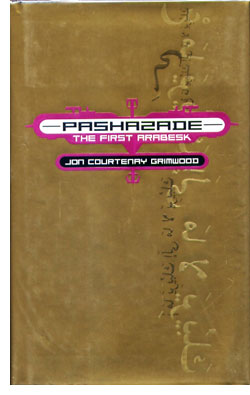 |
 |
 John Courtenay Grimwood
John Courtenay Grimwood
Pashazade: The First Arabesk
Earthlight / Simon and Schuster
UK First Edition Hardcover
ISBN 978-0-7432-0284-8
Publication Date: 05-01-2001
326 Pages ; Price £12.99
Date Reviewed: 04-19-2002
Reviewed by: Rick Kleffel © 2002
Index:
Science Fiction
Mystery
There's a certain zeitgeist that hovers over novels set in Middle Eastern cities. The places themselves, the elaborate houses and palaces, the filthy streets and loud bazaars all become characters, identities with a dialogue of street traffic, shouting vendors and reedy music. 'Pashazade: The First Arabesk' by John Courtenay Grimwood certainly makes the most of its location even though it is imaginary. El Iskandrya is the center of the still-strong Ottoman Empire in Grimwood's odd alternate history. Subject to strong influences from a Germany that won the first world war, a brash America and a refined UK and France, the city is a bazaar, a place of bargains and brokers, of deals and dreams. To El Iskansrya, Grimwood brings Zee Zee, who becomes Ashraf Bey, Pashazade, a member of the city's powerful elite. Until the aunt who brought him there is murdered and he is accused of the murder.
Grimwood never misses a chance to pump up the atmosphere and the mystery. He's not exactly a fair player as a writer. He piles the mystery of who exactly ZeeZee/Ashraf is on top of the mystery of who committed the murder and why on top of the mystery of what exactly is going on in his alternate history. In doing so, he manages to ride the line keeping the reader just a hair's breadth away from understanding exactly why the events that are so poignantly drawn are happening. As one mystery unravels, another unfolds. It's a quintessential science fiction device used effectively in a different context.
Grimwood's dense plot might get annoying if he wasn't such a great prose stylist. When he wants to drench the reader in atmosphere, break out the umbrellas. He mines Durrell's Alexandria Quartet effectively, and like Durrell, makes the setting an equal player to the people. Fortunately, he likes his characters and succeeds in making them endearing and interesting, not just violent an quirky. He under-uses his best creations, Hani, the nine year old computer genius who is still a little girl, and Zara, the woman Ashraf was meant to marry but disgraced when he rejected her. Ashraf is discovering himself as the reader discovers him. What he finds within himself is honor, and that brings him closer to the reader even as his software supplements set him apart. The proto-family unit formed by these three characters really helps carry the reader through the thick stew of the setting and plot.
Grimwood's use of science fiction devices in what is primarily a mystery plot verges on problematic. His alternate history occasionally seems a bit too similar to our own, and it fuzzes around the edges. This could be tightened up in further books (and those are already available), as could the technology. Sometimes, we see stuff that is pretty far out, and other times we see stuff that's pretty much now. Grimwood tosses it all across the ancient background of El Iskandrya, which is clearly the point. El Iskandrya is the kind of city that is always at the border of the "civilized" world, the kind of city where it is always economical for some to live a lifestyle that is only slightly removed from the Middle Ages.
Mostly though, 'Pashazade' is a hypnotic and delightful descent into a fragrant Middle East that has grown as much out of literature as out of reality. Grimwood's language is superb, and his creation is extremely unique. Few who read this novel will be able to easily describe it. It's a literary platypus, with a duck's bill, smooth glossy fur and poison glands. It will create a hermetically sealed world that readers will be able to re-visit once the book is finished. They'll be glad that this is just 'The First Arabesk'. Grimwood has created more than a nice place to visit. Readers will want to live there, every chance they can get.
|
 |
|
|
 |
| |
Review Archive
All Reviews alphabetized by author.
General Fiction
Non-Genre, general fiction and literature.
Horror
Supernatural fiction, supernatural horror and non-supernatural horror.
Science Fiction
Science fiction, science fantasy, speculative fiction, alternate history.
Fantasy
Fantasy, surrealism and magic realism.
Mystery
Crime, thrillers, mystery, suspense.
Non-Fiction
Non-Fiction, True Crime, Forteana, Reference.
Poetry
|
|
 |
|




